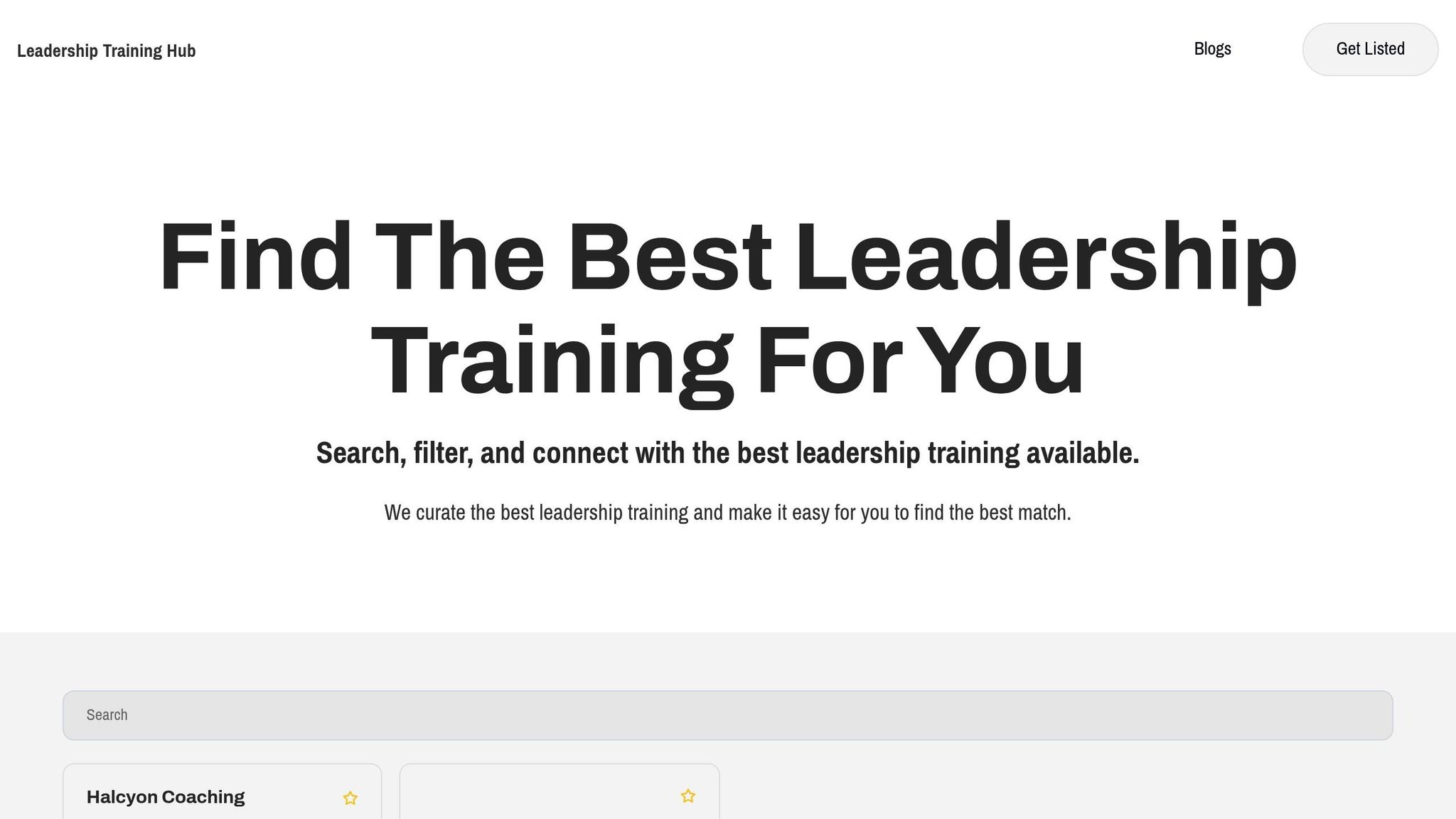Emotional intelligence (EI) is a must-have for leaders who want to handle pressure, build strong teams, and drive performance. It’s about understanding and managing your emotions while connecting with others effectively. Research shows that leaders with high EI are 70% more likely to succeed under stress, and 71% of employers now prioritise EI over technical skills. The five key EI skills every leader should develop are:
- Self-Awareness: Recognise your emotions and how they impact others.
- Self-Regulation: Stay calm and make rational decisions under pressure.
- Empathy: Understand and respond to others' emotions to build trust.
- Social Skills: Communicate clearly and resolve conflicts effectively.
- Motivation: Stay focused on goals and inspire your team.
These skills improve team engagement, productivity, and overall business outcomes, especially in today’s fast-changing work environment. Leaders can develop EI through mindfulness, reflection, active listening, and targeted training programmes. Building EI isn’t just about personal growth - it’s about creating stronger, more connected teams.
Emotional Intelligence: The #1 ability for leaders | Daniel Goleman
Core Emotional Intelligence Skills for Resilient Leadership
Resilient leaders rely on five key emotional intelligence (EI) skills. Together, these skills lay the groundwork for leadership that can endure pressure and inspire teams during challenging times.
Self-Awareness: Understanding and Managing Your Emotions
Self-awareness is the starting point of emotional intelligence. It helps leaders recognise their strengths and limitations, understand how their actions affect others, and take responsibility for their behaviour. This skill is invaluable for spotting early signs of stress or burnout, enabling timely action.
In the UK's diverse workplaces, where varying communication styles and perspectives are common, self-awareness becomes even more important. Leaders can develop this skill by keeping a reflective journal to track emotional patterns or by seeking regular feedback from trusted colleagues or mentors. Many leaders in the UK find that spending just 10 minutes each morning reflecting on the previous day’s interactions helps uncover recurring behaviours.
Once self-awareness is established, self-regulation ensures those insights are channelled into calm and deliberate actions.
Self-Regulation: Maintaining Composure Under Pressure
Self-regulation equips leaders to stay calm, make rational decisions, and avoid impulsive reactions during stressful situations. It focuses on managing emotions constructively, adapting to change, and resolving conflicts effectively.
Remaining composed during crises not only sets a positive tone for the team but also creates a sense of stability in uncertain times. Mindfulness practices like deep breathing, cognitive reframing, and structured reflection are particularly helpful for leaders managing high-pressure scenarios. Tools like the Eisenhower Matrix, which prioritises tasks based on urgency and importance, can assist new managers in balancing their workload and emotions.
This ability to remain steady under pressure also fosters empathetic connections with team members.
Empathy: Strengthening Team Relationships
Empathy is essential for building trust and fostering meaningful connections within a team. Empathetic leaders create environments where team members feel valued, leading to greater engagement and improved performance. In fact, 76% of engaged employees and 61% of innovative team members attribute their success to empathetic leadership. In multicultural workplaces across the UK, empathy is vital for understanding diverse perspectives.
To develop empathy, leaders should practise active listening - giving full attention to team members, acknowledging their emotions, and striving to see situations from their viewpoint. This approach is particularly impactful when managing teams with varied cultural backgrounds, a common scenario in UK organisations.
"Empathy in leadership – the skill or capacity to understand another's frame of reference – is absolutely a distinguishing factor between a good and a great leader."
- Joy Taylor, National Managing Principal, Operational and Organisational Transformation, Grant Thornton US
Strong communication skills further enhance these empathetic connections.
Social Skills: Effective Communication and Collaboration
Social skills are crucial for guiding teams through difficult times. They enhance communication, resolve conflicts, and strengthen collaboration - qualities that are particularly valuable in remote or hybrid work environments.
These skills include the ability to communicate clearly across all levels of an organisation, from front-line staff to senior executives. They also involve conflict resolution and building consensus among diverse stakeholders. Regular team check-ins and transparent communication help maintain trust and prevent small issues from escalating into larger problems.
Motivation: Inspiring Teams Through Challenges
Intrinsic motivation is the final pillar of resilient leadership. This internal drive helps leaders stay focused on long-term goals, even during tough times, and inspires their teams to remain steadfast. Motivated leaders connect their work to their core values, set meaningful objectives, and celebrate progress, creating a sense of momentum that carries the team forward.
To cultivate self-motivation, reflect on what drives you beyond external rewards. Aligning your leadership role with your personal values and the positive impact you aim to make can provide the energy needed to navigate challenges with resilience.
These five emotional intelligence skills are the backbone of resilient leadership. With emotional intelligence accounting for 58% of a leader's job performance, it’s clear that mastering these abilities is essential for effective leadership.
Practical Applications of Emotional Intelligence Skills
Consistently applying emotional intelligence (EI) skills helps leaders build resilient teams and respond effectively to challenges. Here’s how these skills can be put into action daily.
Active listening is a cornerstone of effective communication. Instead of simply waiting for your turn to speak, focus on fully understanding what others are saying. Hosting town halls or one-on-one meetings creates opportunities to hear ideas and concerns. During these conversations, paraphrasing what’s been said and asking open-ended questions shows genuine interest.
"The biggest communication problem is we do not listen to understand. We listen to reply." - Stephen Covey
Creating psychological safety is equally important. This means fostering an environment where team members feel comfortable sharing concerns without fear of judgment. In the UK’s diverse workplaces, where communication styles and backgrounds vary, this approach ensures everyone feels valued and heard.
When active listening and psychological safety are prioritised, managing difficult conversations becomes less daunting. Leaders can prepare by outlining key points, using 'I' statements to avoid blame, and maintaining empathy throughout. For example, instead of saying, "You're always late with reports", try, "I’ve noticed reports have been delayed, and I’d like to understand what challenges you’re facing."
To measure progress, setting clear empathy goals can provide structure. Leaders might aim to reduce team escalations or improve employee satisfaction scores. These measurable targets highlight the impact of focusing on emotional intelligence.
Stress management techniques also play a critical role, especially during high-pressure periods. Mindfulness workshops or access to counselling services can help. Leaders who model these behaviours create a culture where wellbeing is prioritised.
Comparison Table of EI Skills for UK Leaders
| EI Skill | Primary Benefits | Common Challenges | Applications | Development Tips |
|---|---|---|---|---|
| Self-Awareness | Recognises emotional triggers; improves decision-making | Requires honest self-reflection; hard to assess objectively | Daily emotional check-ins; seeking feedback; journaling | Spend 10 minutes reflecting on daily interactions |
| Self-Regulation | Maintains composure; improves adaptability | Difficult during crises; requires consistency | Breathing exercises; prioritisation tools like Eisenhower Matrix | Practise mindfulness; develop reflection habits |
| Empathy | Builds trust; enhances team engagement | Time-intensive; emotionally demanding | Active listening; acknowledging challenges; understanding perspectives | Schedule one-on-ones; practise perspective-taking |
| Social Skills | Improves collaboration; resolves conflicts | Adapting to different personalities; virtual challenges | Regular team check-ins; transparent updates; conflict resolution | Build consensus skills; practise clear communication |
| Motivation | Inspires teams; maintains focus on goals | Hard to sustain during prolonged challenges | Celebrating progress; connecting work to values | Reflect on personal drivers; align work with impact goals |
Investing in team members’ growth is another way to reinforce emotional intelligence. Leaders who support personal development - whether through training opportunities, career advancement, or simply recognising contributions - build loyalty and enhance performance.
Fostering community is especially crucial in hybrid and remote work setups, which are common in the UK. Encouraging collaboration through group projects, virtual coffee chats, or team-building activities helps maintain strong connections, even when colleagues aren’t physically together.
sbb-itb-fa39ac2
Using Leadership Training Hub for EI Development

Developing emotional intelligence (EI) skills is vital for resilient leadership, but finding the right training to match your organisation's unique challenges can be tricky. Leadership Training Hub makes this process easier by offering a comprehensive directory of EI training providers across the United Kingdom. Whether you're a seasoned leader or just starting your journey, this platform helps you find programmes that align with your goals, schedule, and budget.
The directory includes a wide range of providers, from independent consultants to established training companies. You'll find options for in-person workshops, virtual sessions, and blended learning formats. These programmes often focus on key EI areas like self-awareness, self-regulation, empathy, communication, and relationship-building - critical skills for effective leadership.
Training costs vary depending on the format and provider. For example, APSCO's Leading with Emotional Intelligence programme starts at £620 for members (£740 for non-members), while Hemsley Fraser offers individual courses starting at around £620 (plus VAT). For organisations, private workshops from providers like ACHIEVE Centre for Leadership begin at £1,600 for a half-day session, with full-day programmes priced from £2,560. Online courses typically offer a more affordable option, while coaching programmes provide personalised attention, albeit at a higher cost.
When choosing a provider through Leadership Training Hub, it's important to consider their credentials, client testimonials, and measurable outcomes. For instance, RocheMartin's training helped Sky achieve a 25% improvement in empathy, a 21% boost in relationship-building skills, and a 17% increase in adaptability - contributing to 20 consecutive quarters of growth and a buyout worth over £40 billion. Similarly, their work with Oracle led to 92% of sales staff developing more positive attitudes towards their roles.
"What I love about this course is that I didn't just learn about the topic, this course is about ME. I'm confident I can reliably use my new skills, even when under pressure."
– A Project Manager At A Tech Company
Practical application is another key consideration. Lancashire County Council's experience with EI training highlighted how participants gained not only a strong understanding of emotional intelligence but also practical tools they could use immediately with their teams.
The growing importance of EI skills makes this investment worthwhile. McKinsey & Company predicts that demand for emotional intelligence, collaboration, and other soft skills will rise by over 30% in Europe by 2030. Furthermore, 71% of employers now prioritise emotional intelligence over IQ when hiring.
Leadership Training Hub's platform allows users to compare providers based on their specialisations, delivery methods, and pricing. This transparency ensures you can choose a programme that delivers real results, not just a certificate. Providers offer everything from foundational EI sessions to advanced leadership programmes, with some even customising content to meet the specific needs of your organisation.
"Leaders with a higher degree of Emotional Intelligence (EI) connect on a deeper level with their colleagues and teams, leading to greater buy-in, commitment, and ultimately better positioning to achieve sustainable results."
– APSCO
Whether you're focusing on personal growth or planning organisation-wide training, Leadership Training Hub connects you with the resources needed to build the EI skills essential for resilient leadership. By selecting the right provider, you can ensure your training investment leads to practical, measurable improvements in leadership effectiveness.
Conclusion: Building Resilient Leadership Through Emotional Intelligence
Emotional intelligence (EI) plays a pivotal role in shaping resilient leadership. Research from TalentSmart reveals that EI contributes to 58% of professional success, with 90% of top performers demonstrating high emotional intelligence. These five core EI skills form the backbone of resilient leadership, significantly boosting performance under pressure.
According to DDI, leaders who excel in empathy outperform their peers by over 40% in coaching, engaging others, and decision-making. Additionally, leaders with strong emotional intelligence are 70% more likely to succeed in high-stress environments. These figures highlight the real-world advantages of cultivating EI, both for individuals and organisations.
The practical benefits of developing EI are clear. For example, unresolved workplace conflicts can consume up to eight hours per incident in lost productivity. Leaders who apply EI principles can mitigate these disruptions, fostering stronger, more collaborative teams in the process.
As organisations navigate an increasingly complex business environment - marked by remote work, rapid change, and the demand for responsible leadership - leaders who connect meaningfully with their teams, remain composed under pressure, and inspire resilience will stand out.
Continuous development of EI isn’t just about improving personal performance; it’s about creating cohesive teams and nurturing positive work cultures. Building emotional intelligence is an ongoing process - one that involves regular self-reflection, seeking feedback, and practising mindfulness. Leaders who embrace this journey are better equipped to tackle future challenges and foster environments where talent thrives.
The takeaway is straightforward: emotional intelligence must be a priority for any leader aiming to succeed in today’s dynamic world. Whether through structured training, peer feedback, or daily mindfulness exercises, committing to EI development will not only enhance your effectiveness but also solidify your role as a resilient, impactful leader.
FAQs
What practical steps can leaders take to build emotional intelligence in a high-pressure work environment?
Leaders can build stronger emotional intelligence by honing self-awareness and practising empathy. Taking time for self-reflection - through activities like journaling or mindfulness - can help them better understand their emotions and how they respond to different situations. Empathy, on the other hand, grows when leaders actively listen to their team members and genuinely consider their viewpoints.
In fast-moving workplaces, managing stress effectively becomes essential. Techniques like deep breathing or body scan exercises can help leaders identify and control emotional triggers before they escalate. At the same time, prioritising clear communication and fostering a workplace where people feel psychologically safe can encourage open conversations and build trust, which is the foundation for a thriving team.
To keep improving, leaders can also explore workshops or leadership training programmes. These provide practical tools and fresh perspectives to help them deepen their emotional intelligence and better support their teams.
What advantages can organisations gain by focusing on emotional intelligence in leadership development?
Organisations that prioritise emotional intelligence in their leadership programmes often reap numerous rewards. These include better communication, greater employee satisfaction, and enhanced team performance. Leaders with strong emotional intelligence skills are adept at managing their own emotions, handling challenges effectively, and building trust within their teams.
Focusing on emotional intelligence can also lead to smoother conflict resolution and create leaders who are resilient and adaptable in the face of change. This approach not only improves team cohesion but also lays a solid foundation for long-term organisational success and stability.
How does emotional intelligence help leaders manage stress and build resilience?
Emotional intelligence (EI) gives leaders the tools to identify, understand, and manage their own emotions, helping them stay composed and focused even in high-pressure situations. This self-awareness and control play a key role in managing stress and recovering from setbacks effectively.
On top of that, EI strengthens empathy and communication, enabling leaders to form meaningful relationships and build supportive networks. These connections are essential for staying resilient and tackling tough challenges with assurance. By honing these EI skills, leaders can cultivate an environment that prioritises well-being and flexibility during difficult times.


